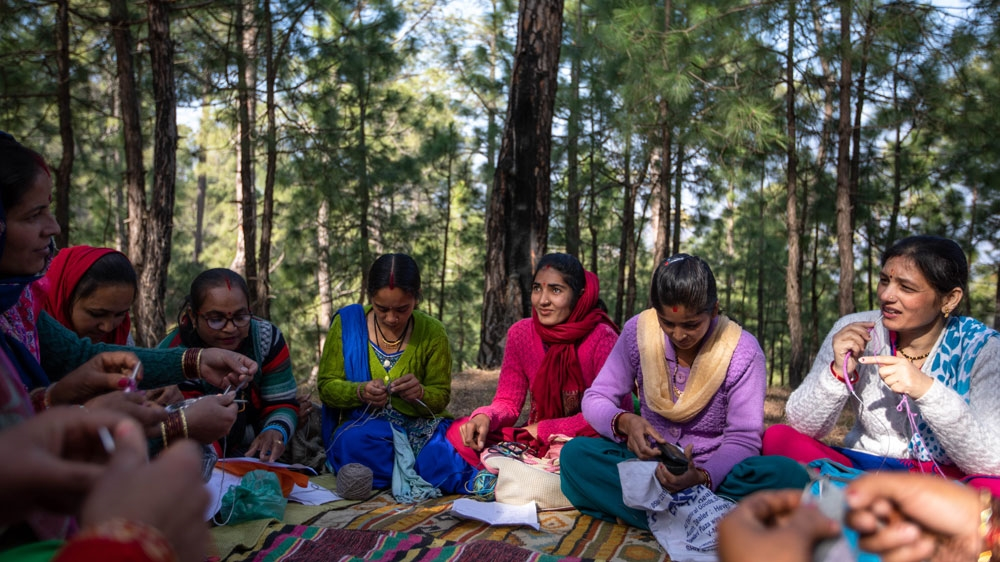“Master, save us!”
I was sitting in a plastic chair in a stuffy cement room in Southern India, watching as a group of men acted out the Bible story that we’d taught them only hours earlier.
Today’s story was Jesus calming the storm from Matthew 8. The “disciples” shouted, pretending to be blown about by the wind and shaking the shoulder of a sleeping “Jesus,” who dramatically snored at the back of their pretend boat.
Every month or so, we would host these training sessions. Sometimes we would travel, other times participants would join us in our base city in Northern India. The participants always came from smaller villages, but they had one thing in common – the Bible was not translated into their heart language.
Bible translation is a long process. It can take years to get a quality translation, and in a country where there are over 100 languages and many more unique dialects, there had to be another way to get the Bible into the hearts of the people.
So we started with stories.
The training went like this: My team and I would work with a translator to tell a short story from the Bible. We would tell it several times, emphasizing each part of the story clearly. But we weren’t just reading the words off the page. We would put it into our own words and use storytelling techniques to keep everyone engaged. We started with a simplified version of the story — four to five sentences max. Then we would expand on it.
After we’d told the story five or six different times, we split the trainees into groups and asked them to translate the story in their own language — and act it out.
The stories came alive to them.
Watching these men and women debate which words to use in their stories and then act them out was a joy. The Bible wasn’t just some distant text, it was active and interacting with them. We would continue to work with them, tweaking meanings here or there until they mastered the telling of a story that was as faithful as possible. By the time the training was done, each person was sent back to their village with five or six memorized stories.
But storytelling didn’t just make it easier for people to translate and memorize scripture. It also made scripture engaging and fun.
Anyone can tell these stories.
We trained little children, grown adults, and old, bent men and women to act out story after story. They had fun, and fell in love with the God of the Bible in the process.
Storytelling also allowed people to focus on the personal side of the Bible.
One day, I was sitting with a group of women, telling the story of the bleeding woman from Luke 8. This particular group of women had grown up in a very strict society. The rules the bleeding woman had to observe under Jewish law were very similar to the way they were raised. When I reached the part of the story where Jesus turned and asked who touched Him, the women were afraid. They were familiar with the shame and punishment that could sometimes accompany religious laws.
They could see themselves in this story.
Most good stories have a turn — a moment that subverts your expectations. A moment that surprises you. If I’m honest, I had stopped viewing the Bible as a good story. It was familiar. Rote. My devotional, a daily chore. But sitting on the ground with those women that day, steaming cups of chai in between us, my view of that story changed.
As I continued the story, one of the women began to weep. She was overwhelmed with the kindness and the mercy Jesus showed. It turns out, she had a family member with a similar illness — one she hadn’t been allowed to see for years.
“I did not know that Jesus would care for us like that. I did not know He was so different,” she said.
Although I grew up in the church, two years of telling Bible stories in India changed my relationship to the Word of God. They are more than just stories to me. Jesus suddenly felt alive, in a way I’d never seen Him before.
I’d sat in so many services throughout my life and memorized so many verses, but it was the stories that helped those verses take hold in my heart.
“God does not merely give us teaching, He gives us history.” –Martyn Lloyd-Jones
In giving us His Word, God didn’t just give us a list of rules and ideas. He gave us stories, and we must learn how to tell them and become the greatest storytellers in the world.
Emily Towns, Staff Writer, Paper Giants



0 Comments